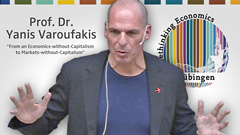Introduction to Pluralism in Economics - From an Economics-without-Capitalism to Markets-without-Capitalism
Varoufakis, Yanis
(2020)
| mla clipboard |
Varoufakis Y. "Introduction to Pluralism in Economics - From an Economics-without-Capitalism to Markets-without-Capitalism.", timms video, Universität Tübingen (2020): https://timms.uni-tuebingen.de:443/tp/UT_20200203_001_rethinkeco_0001. Accessed 05 Feb 2026. |
| apa clipboard |
Varoufakis, Y. (2020). Introduction to Pluralism in Economics - From an Economics-without-Capitalism to Markets-without-Capitalism. timms video: Universität Tübingen. Retrieved February 05, 2026 from the World Wide Web https://timms.uni-tuebingen.de:443/tp/UT_20200203_001_rethinkeco_0001 |
| harvard clipboard |
Varoufakis, Y. (2020). Introduction to Pluralism in Economics - From an Economics-without-Capitalism to Markets-without-Capitalism [Online video]. 3 February. Available at: https://timms.uni-tuebingen.de:443/tp/UT_20200203_001_rethinkeco_0001 (Accessed: 5 February 2026). |
| file download | bibtex endnote |
Information
current

01:30:42
Introduction to Pluralism in Economics - From an Economics-without-Capitalism to Markets-without-Capitalism
(2020-02-03)
related
